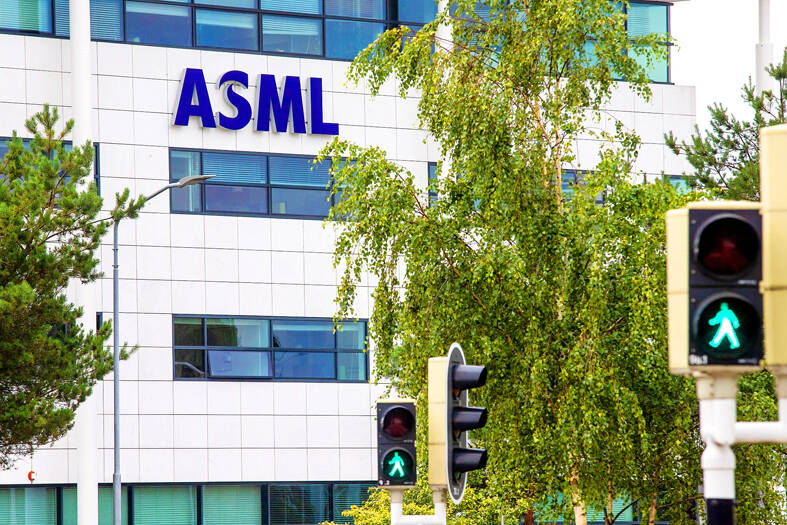Semiconductor equipment supplier ASML Holding NV yesterday overcame the first hurdle to build a NT$30 billion (US$948.6 million) manufacturing fab in New Taipei City’s Linkou District (林口) after receiving approval from the Urban Development Bureau.
The Netherlands-based company aims to start operation of the new facility in 2026 at the earliest, the bureau said in a statement yesterday.
The new factory would house about 2,000 employees, when ASML completes the first-phase construction three years from now, the bureau said.

Photo: Bloomberg
ASML is the sole supplier of extreme ultraviolet lithography tools to Taiwanese manufacturers, including Taiwan Semiconductor Manufacturing Co (台積電), to produce advanced 3-nanometer and 5-nanometer chips.
ASML requires additional grants from the New Taipei City Government to go ahead with the company’s biggest investment in Taiwan, including passing an environmental impact assessment.
The city government said it would not be a time-consuming process as ASML’s new manufacturing fab would be in a redevelopment zone, supporting the city’s efforts to reach net zero emissions.
ASML’s new factory is to occupy 3.3 hectares of land. The factory aims to capture 12 tonnes of carbon a year by planting trees and adopting other approaches to reduce carbon emissions, the bureau said.
The city government aims to develop Linkou into a hub for artificial intelligence and smart technologies, with ASML being the first tech company to make Linkou its home, the bureau said.
The city plans to lure companies in the AI, 5G, big data and analytical areas to set up operations in Linkou, it added.

GROWING OWINGS: While Luxembourg and China swapped the top three spots, the US continued to be the largest exposure for Taiwan for the 41st consecutive quarter The US remained the largest debtor nation to Taiwan’s banking sector for the 41st consecutive quarter at the end of September, after local banks’ exposure to the US market rose more than 2 percent from three months earlier, the central bank said. Exposure to the US increased to US$198.896 billion, up US$4.026 billion, or 2.07 percent, from US$194.87 billion in the previous quarter, data released by the central bank showed on Friday. Of the increase, about US$1.4 billion came from banks’ investments in securitized products and interbank loans in the US, while another US$2.6 billion stemmed from trust assets, including mutual funds,

AI TALENT: No financial details were released about the deal, in which top Groq executives, including its CEO, would join Nvidia to help advance the technology Nvidia Corp has agreed to a licensing deal with artificial intelligence (AI) start-up Groq, furthering its investments in companies connected to the AI boom and gaining the right to add a new type of technology to its products. The world’s largest publicly traded company has paid for the right to use Groq’s technology and is to integrate its chip design into future products. Some of the start-up’s executives are leaving to join Nvidia to help with that effort, the companies said. Groq would continue as an independent company with a new chief executive, it said on Wednesday in a post on its Web

JOINT EFFORTS: MediaTek would partner with Denso to develop custom chips to support the car-part specialist company’s driver-assist systems in an expanding market MediaTek Inc (聯發科), the world’s largest mobile phone chip designer, yesterday said it is working closely with Japan’s Denso Corp to build a custom automotive system-on-chip (SoC) solution tailored for advanced driver-assistance systems and cockpit systems, adding another customer to its new application-specific IC (ASIC) business. This effort merges Denso’s automotive-grade safety expertise and deep vehicle integration with MediaTek’s technologies cultivated through the development of Media- Tek’s Dimensity AX, leveraging efficient, high-performance SoCs and artificial intelligence (AI) capabilities to offer a scalable, production-ready platform for next-generation driver assistance, the company said in a statement yesterday. “Through this collaboration, we are bringing two

Even as the US is embarked on a bitter rivalry with China over the deployment of artificial intelligence (AI), Chinese technology is quietly making inroads into the US market. Despite considerable geopolitical tensions, Chinese open-source AI models are winning over a growing number of programmers and companies in the US. These are different from the closed generative AI models that have become household names — ChatGPT-maker OpenAI or Google’s Gemini — whose inner workings are fiercely protected. In contrast, “open” models offered by many Chinese rivals, from Alibaba (阿里巴巴) to DeepSeek (深度求索), allow programmers to customize parts of the software to suit their